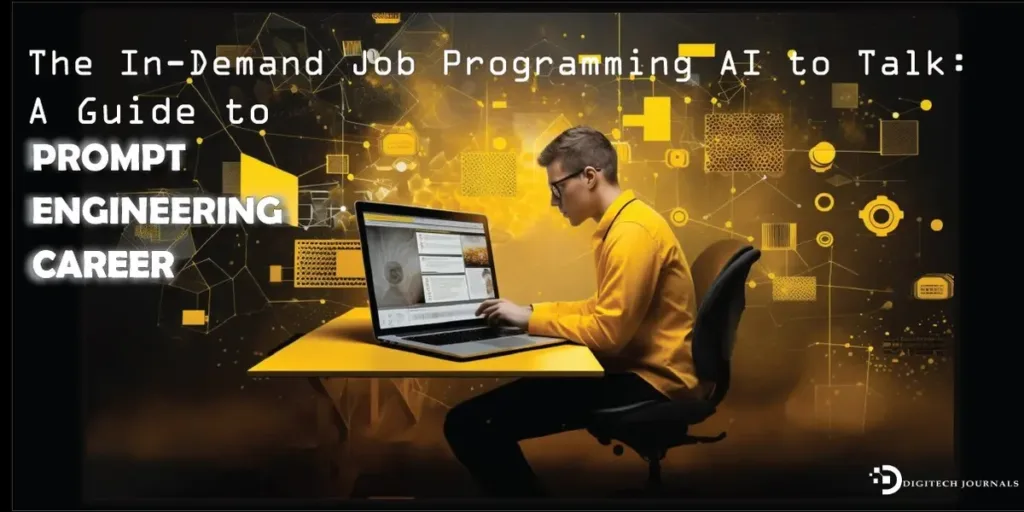Introduction
In our daily lives, we’re engaging with technology in ways more human than ever. Siri, Alexa, Google Assistant – these AIs grasp our speech, answer queries, and engage in basic conversations. However, behind each response lies a cadre of prompt engineers meticulously sculpting these interactions. These are the innovative minds shaping our dialogue with computers.
Prompt engineers are the architects behind the prompts, questions, and responses that teach conversational AI systems the intricacies of human communication. It’s a challenging yet rewarding profession that fuses technical prowess with creativity. With the advancement of AI master key, the demand for prompt engineers is skyrocketing. Giants like Apple, Amazon, Microsoft, and numerous startups rely on these professionals. The role involves not just testing conversations but also creating prompts to bridge gaps, requiring engineers to think like everyday users. It demands robust language skills and an understanding of human interaction.
At its zenith, being a prompt engineer mirrors the finesse of creative writing. You’re constructing the foundations that enable people to have captivating discussions with AI. The objective is to make these exchanges as natural as conversing with a friend. Witnessing your work power everyday technologies is immensely gratifying.
For those with a technical mindset coupled with a penchant for communication, prompt engineering could be a perfect fit. This field melds skills in machine learning, natural language processing, and linguistics. While a degree in computer science or engineering provides a solid foundation, employers also value experience in writing, customer service, or technical support.
Continuous learning is inherent to the role as conversational AI evolves swiftly. Prompt engineers stay abreast of the latest research and best practices through conferences, online courses, and independent study. The job is a playground for those with a growth mindset.
The future of human-computer interaction hinges on the innovative work of prompt engineers. As AI becomes more entrenched in our lives, these professionals will play a pivotal role in ensuring technology genuinely comprehends human needs. For those yearning for an in-demand career at the forefront of innovation, prompt engineering beckons.
What is a Prompt Engineer?
As AI technology advances, the role of a prompt engineer has become pivotal in designing how these systems interact with people. Prompt engineer dedicates their efforts to crafting the language that imparts conversational AI with the ability to understand and respond to users.

The primary responsibility of a prompt engineer revolves around generating prompts – questions, statements, or conversations used to train machine learning models. This entails meticulously designing sample text that exposes AI to a spectrum of topics, questions, and dialogue structures it might encounter from real people. Engineers rigorously test the model through sample conversations to unearth any gaps in its knowledge or its ability to comprehend language naturally. Any shortcomings are addressed by generating new prompts to refine the model. Continuous evaluation ensures that AI can adeptly understand and respond to users.
A day in the life of a prompt engineer may involve brainstorming new prompt ideas at their company’s AI lab, crafting sample conversations covering trending news or customer support topics, and collaborating with colleagues to review testing results and plan the next phase of work.
Engineers also stay abreast of advances in the field through research, seeking new techniques that could enhance how prompts instruct AI. Continuous learning ensures their skills and technology remain cutting-edge.
Some engineers specialize in specific models, such as chatbots for customer service, virtual teaching assistants, or conversational marketing platforms. Their prompts are tailored to the specific use case. Others lead teams developing prompts at major tech corporations like Apple or Microsoft.
Whether working independently or managing a group, the ultimate goal is to make the AI’s responses to prompts as natural as conversing with another human. It’s fulfilling work that directly shapes how people interact with emerging technologies on a daily basis.
In summary, as a prompt engineer, you’re at the forefront of programming AI to communicate like people. The job requires creativity, technical skills, and a passion for creating seamless and helpful conversational interfaces.
Skills and Qualifications: The Art of Prompt Engineering
Designing effective prompts that impart human-like conversation skills to AI demands a unique fusion of technical expertise and creative talents. Let’s delve into the top skills and qualifications prompt engineers need to excel in this dynamic career field.
Educational Background
While a 4-year degree isn’t mandatory, many prompt engineers hold a Bachelor’s in computer science, linguistics, cognitive science, or related disciplines. These majors instill fundamental knowledge in language, machine learning techniques, and the intersection of technology with user interaction. In some roles, a Master’s in artificial intelligence engineering or natural language processing can confer an advantage. In essence, a robust foundation in both technical and communication-focused studies is invaluable.
Language and Communication Skills
Programming AI to converse like people necessitates superb abilities to understand, analyze, and generate human language naturally. Exceptional written and verbal communication skills are vital to craft prompts covering a wide range of everyday topics. Engineers must also think critically about linguistic patterns and discourse structure. Interpersonal skills come into play when collaborating with teammates.
Technical Expertise
While the creativity of writing prompts is crucial, prompt engineers must also grasp the technical intricacies of conversational AI systems. Core technical qualifications encompass experience with machine learning algorithms, natural language processing methodologies, and the development of training datasets. Familiarity with programming languages like Python is common. Staying abreast of advances through self-study remains crucial as technology evolves rapidly.
Creativity and Problem-Solving
Devising engaging prompts that feel human-like while meeting technical objectives demands out-of-the-box thinking. Prompt engineers need robust creative problem-solving abilities to consistently generate new and innovative prompt ideas. An aptitude for storytelling aids in crafting prompts that emulate natural discussion flows. Curiosity and a willingness to experiment with unconventional prompt styles are highly valued traits.
Attention to Detail
As prompts directly shape how AI systems respond, prompt engineers must possess laser-sharp attention to detail. Thorough review is essential to ensure prompts are grammatically correct, cover a balanced set of scenarios, and align with technical specifications. Engineers double-check that no factual errors or inconsistencies could undermine the quality of the AI’s training.
Project Management Skills
Senior prompt engineers often find themselves leading teams and overseeing large prompt development projects. Experience in planning, task assignment, progress tracking, and ensuring deadlines are met through robust project management becomes vital. Collaboration and mentoring abilities optimize team performance and outcomes.
Constant Learning Mindset
In any rapidly evolving technical field, maintaining expertise in prompt engineering demands continuous learning. Professionals in this space actively expand their knowledge through online courses, technical literature, and attending AI-focused conferences and seminars. A growth-oriented attitude helps engineers adapt to emerging techniques.
Career Path and Outlook: Flourishing Opportunities in Conversational AI
As the use of AI assistants, chatbots, and other conversational technologies expands, prompt engineers are in high demand globally. Let’s explore the promising career outlook and avenues for growth in this dynamic field.
Job Opportunities
Major tech corporations like Apple, Amazon, Microsoft, and Google boast large prompt engineering teams and continue to expand. Startups developing AI for healthcare, education, and other industries are also on the lookout for talent. Remote opportunities allow contributions from anywhere, opening the field to a more globally diverse talent pool. Remote work sets prompt engineers up for flexible, location-independent careers at the forefront of technology.
Advancement Potential
Engineers accumulate skills to transition into leadership roles, directing prompt teams or overseeing the development of AI models. Technical project managers ensure deadlines and goals are met across departments. Some shift to AI research, exploring novel techniques, while others embark on entrepreneurship. The pursuit of continuous learning keeps career options open.
Growth Industries
As AI permeates more domains, new use cases demand tailored prompts. Healthcare chatbots assisting patients witness rapid growth. Educational tools aiding learners through personalized conversations proliferate. E-commerce sites enhance shopping with chat features. Demand will remain robust as conversational interfaces become even more integral to daily life and work.
Remote Opportunities
Many prompt engineering roles have transitioned to fully remote setups in the digital era. This not only allows professionals to live anywhere while contributing value but also diversifies the talent pool globally. Remote work positions prompt engineers for flexible, location-independent careers at the cutting edge of technology.
Job Security
As AI capabilities advance, so too will the need for skilled professionals programming this technology. Prompt engineers play a pivotal role in ensuring AI systems truly understand human needs. Their work will stay in high demand as conversational interfaces become more sophisticated and ubiquitous. Job security in this burgeoning field is excellent.
For creative problem-solvers who relish blending technical and communication skills, a career in prompt engineering promises engaging work, flexibility, growth opportunities, and the satisfaction of directly shaping emerging technologies. The outlook for this riveting role is exceptionally bright.
As a Final Note
Throughout this discourse, we’ve delved into the enthralling realm of prompt engineering – the architects behind the language that brings AI systems to life in natural human conversations. As a prompt engineer, each day unfolds with new creative challenges and the satisfaction of applying technical skills to shape technologies that enhance lives.
By designing prompts that teach AI how people communicate, prompt engineers play a pivotal role in advancing conversational interfaces. Their innovative work programming systems to understand language like humans will remain critical as AI adoption grows across industries, improving customer service, education, healthcare, and beyond.
As elucidated, opportunities in this sought-after field abound in leading tech corporations, startups developing specialized AI applications, and even fully remote roles. Armed with a strong foundation in computer science, linguistics, or related fields, combined with technical prowess and creativity, prompt engineers craft the building blocks that power AI systems interacting with millions worldwide.
For those aspiring to join this dynamic and meaningful career path, here are some tips:
- Earn a bachelor’s degree in computer science, engineering, or another STEM field, complemented by communication-focused courses to develop language analysis skills. Consider further education with a master’s in AI or machine learning.
- Gain hands-on experience through internships at AI startups or labs at major tech companies to gain exposure to real-world prompt engineering projects.
- Develop a portfolio by participating in hackathons or independently designing sample conversation prompts and datasets to showcase skills during interviews.
- Stay abreast of advances through online courses and certifications in areas like natural language processing, machine learning techniques, and commonly used programming languages.
- Attend AI and tech conferences to network, learn about new research, and potentially find job opportunities from recruiting companies. Conferences are also excellent platforms for sharing your own prompt engineering ideas.
- Consider freelancing or consulting to gain real client work experience while in school or when seeking full-time roles. This builds a resume and references.
With continuous learning and a passion for the field, robotics engineers and prompt engineers can look forward to fulfilling careers shaping the future of human-AI interaction. As technology progresses to understand us more naturally, their innovative work designing conversational prompts will remain crucial for AI to genuinely comprehend what people need.
In summary, prompt engineering offers an engaging career at the forefront of innovation, providing opportunities to directly apply technical skills to impactful projects. For creative problem-solvers interested in programming language itself, this may be the ideal profession, designing how humans and computers converse.



